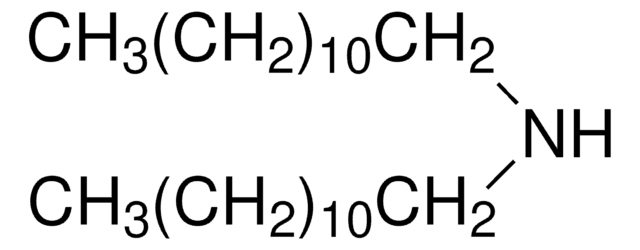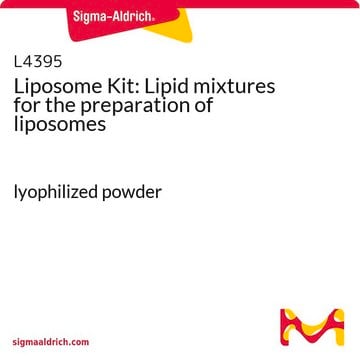42358
Dioctadecylamine
≥99.0% (NT)
Synonyme(s) :
DODA, Distearylamine
About This Item
Produits recommandés
Niveau de qualité
Pureté
≥99.0% (NT)
Pf
71-73 °C
Solubilité
water: soluble(lit.)
Groupe fonctionnel
amine
Chaîne SMILES
CCCCCCCCCCCCCCCCCCNCCCCCCCCCCCCCCCCCC
InChI
1S/C36H75N/c1-3-5-7-9-11-13-15-17-19-21-23-25-27-29-31-33-35-37-36-34-32-30-28-26-24-22-20-18-16-14-12-10-8-6-4-2/h37H,3-36H2,1-2H3
Clé InChI
HKUFIYBZNQSHQS-UHFFFAOYSA-N
Vous recherchez des produits similaires ? Visite Guide de comparaison des produits
Catégories apparentées
Description générale
Application
- Dioctadecylamine-BCN (bicyclo[6.1.0]nonyne) conjugate.
- Lipid derivatives of bisethylnorspermine (BSP).
- Functional VP (N-vinylpyrrolidone ) polymers.
- As a reactant in the synthesis of 4,4′-azobis(4-cyano-N,N-dioctadecyl)pentanamide (DODA-501) by reacting with disuccinimidyl 4,4′-azobis(4-cyanovalerate).
- As a reagent in the synthesis of dioctadecyl heptapeptides.
- As a phase transfer and stabilizer agent for gold nanoparticles (AuNPs) in non-polar solvent.
Mention d'avertissement
Warning
Mentions de danger
Conseils de prudence
Classification des risques
Eye Irrit. 2 - Skin Irrit. 2 - STOT SE 3
Organes cibles
Respiratory system
Code de la classe de stockage
11 - Combustible Solids
Classe de danger pour l'eau (WGK)
WGK 3
Point d'éclair (°F)
Not applicable
Point d'éclair (°C)
Not applicable
Équipement de protection individuelle
dust mask type N95 (US), Eyeshields, Gloves
Faites votre choix parmi les versions les plus récentes :
Déjà en possession de ce produit ?
Retrouvez la documentation relative aux produits que vous avez récemment achetés dans la Bibliothèque de documents.
Les clients ont également consulté
Notre équipe de scientifiques dispose d'une expérience dans tous les secteurs de la recherche, notamment en sciences de la vie, science des matériaux, synthèse chimique, chromatographie, analyse et dans de nombreux autres domaines..
Contacter notre Service technique










